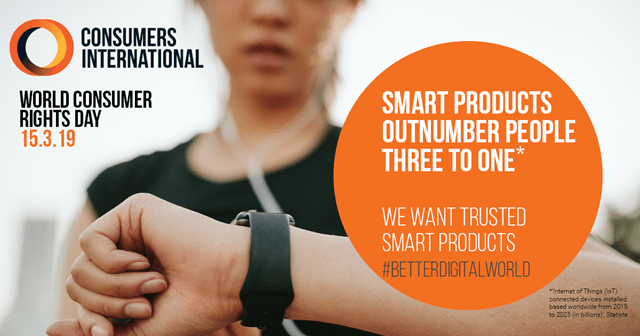World Consumer Rights Day 2019

Smart cards, smart phones, smart TVs, smart ACs, smart remotes, smart glasses smart apps and even smart homes – we are now surrounded by endless list of “smart products.” But are we being smart using these smart products? Think. Pause. Think Again. We are getting connected by default. However, issues of being digitally connected are more than one. Privacy issues, security challenges are only a few to name. World Consumer Rights Day which is celebrated every year on March 15th is the right platform to highlight what consumers want and need from a connected world and put them at the heart of the development of these digital products and services.
What is World Consumer Rights Day
15th March is World Consumer Rights Day. In 1962 President John F Kennedy first outlined the definition of Consumer Rights on this very day. Consumer Organisations all over the world come together every year to highlight and raise awareness on issues concerning consumers.
THEME OF WORLD CONSUMER RIGHTS DAY 2019
The theme of World Consumers Rights Day 2019 is Trusted Smart Products. Currently there are 23.1 billion smart products in the world, outnumbering people three to one.
As more people come online across the world, smart products are changing not only the way we run, we eat, we watch but also the way we work. Smart consumer products are marking a major change in the way many consumers interact with products and services.There are, however, some significant causes for concern like lack of security, privacy and meaningful choice over how we use them, as well as a lack of clarity about who is responsible when things go wrong.
What is a Smart Product
In the last few years the word “smart” has been in use for new consumer products very frequently like smart watch, smart phone, smart door lock and so on.Recent innovations in microchips and sensor technology have changed the way we use and see consumer products today. This technology enables physical products to be filled with intelligence, sensing- and communication abilities.Any product that can connect, share and interact with its users and other devices is termed as a smart product.
CHALLENGES WITH SMART PHONES AND SMART DEVICES

There is hardly an iota of doubt that smart phones have made our life easy. But it has compromised our data security and privacy in ways more than one.
DATA PRIVACY AND PROTECTION
Use of any app or even to update the software of any smart device, it requires your private data like email and phone number. A significant data privacy risk arises from devices being able to communicate with each other and to transfer data autonomously to third parties. Third parties usually collate and consume data which could reveal accurate knowledge of your online activity and invade your online privacy.
SAFETY AND SECURITY
In 2016, a major cyberattack disrupted internet services across North America and Europe by attacking unsecure printers, home wifi routers and baby monitors allowing the virus to spread quickly, infecting nearly 65,000 devices in less than 24 hours. In India “As per the information reported to and tracked by Indian Computer Emergency Response Team (CERT-In),” the number of cyber security incidents reported were 44,679 in 2014, 49,455 in 2015 which rose to 50,362 in 2016. Researchers have also shown that malware can hack devices and remotely control all your smart products.
TRANSPARENCY
Though consumers are becoming aware of security and cyber issues, yet how it relates to the business model of a particular organisation is unclear. A study by 25 international privacy regulators showed 59% of devices failed to adequately explain to customers how their personal information was collected, used and disclosed.
SECURITY UPDATES
One needs to constantly update their smart devices to save itself from virus attack. However, companies hardly share any agreement with the consumers on providing them with the latest updates.
WHAT DO WE WANT TO ACHIEVE?
As smart products are now a common part of our daily lives, it is important to build a process of security so that it is easy and robust for consumers. Taking this opportunity, we would want to increase access to these devices through fair data pricing, a better internet infrastructure as well as securing protections for consumers using second-hand devices.
IMPORTANT POINTS
Consumers should have access to an affordable, high-quality, high-speed internet connection to connect the network of devices such as vehicles, phones and home appliances.
It is often found that regular security updates are not received by the consumers which lead to hacking and data theft. Therefore products should be sold with basic standard security and updates should be provided for a reasonable period after sale.
Consumers’ privacy and data protection rights must be properly protected and upheld to address potential harms such as discriminatory practices, invasive marketing, loss of privacy and security breaches.
Connected products should abide by interoperable and compatible device and software standards to avoid lock-in effects and enhance consumers’ ability to easily compare and switch providers.
For details on campaign outline, click here
